For a Better Davidson.
ACollege Democrats and Republicans comment on voting laws across America.
3
Claire Ireland ‘28 discusses the intricacies of Yik Yak.
Meet the senior field hockey captains.
The Yowl dives into their own political debate.

For a Better Davidson.
ACollege Democrats and Republicans comment on voting laws across America.
Claire Ireland ‘28 discusses the intricacies of Yik Yak.
Meet the senior field hockey captains.
The Yowl dives into their own political debate.
HALLE CARNS ‘28 (SHE/HER) STAFF WRITER
ssistant Dean of Students and Director of Residence Life Walter Snipes has made the decision to step down after nearly ten years of service to Davidson College. While Davidson searches for a permanent replacement, Shawn McQuillan-Krepps will replace Snipes as interim Director of Residence Life. Snipes left Davidson College on September 27th and began at Lafayette College on October 1st, according to The Lafayette
As Snipes’s colleagues reflect on his time at Davidson, they emphasize his ability to create a welcoming environment.
“He’s able to […] make everyone feel really happy and welcome, and make the parents feel comfortable as well as students for their freshman year,” Teagan Crye ‘25 said, who worked with him as a Resident Advisor, Hall Counselor, and employee in the Residence Life Office (RLO).
“If anything gets a tiny bit too out of hand, he always maintains so much [professionalism] in the office [...] which is refreshing to see, because I feel like sometimes there’s hypocrisy in positions of power where they don’t necessarily hold their staff to the same standard that they hold the students to, but he really does,” Crye said.
Charlene Kilpatrick, current Associate Director of Residence Life, worked with Snipes to help train new Hall Counselors and Resident Advisors and oversee general conduct. “In his role, he always wants to make sure that he has a positive interaction with the student, even if it is sometimes having that educational conversation, but he wants to know that he has made an impact on students, and I think he has made [that] impact,” Kilpatrick said.
Snipes facilitated community events and inclusivity among students. “Dean Snipes was one of few black-identifying deans within student life, and so he took his role as an advocate for black students at Davidson very seriously,”
Sarah Taylor, who worked with Snipes from 2017-2022 as the previous Assistant Director of Residence Life, said in a virtual interview.
“He directly advised the [Black Student Coalition], and in a lot of other ways, [he] really worked to enhance the experience of black students at Davidson,” Taylor continued.
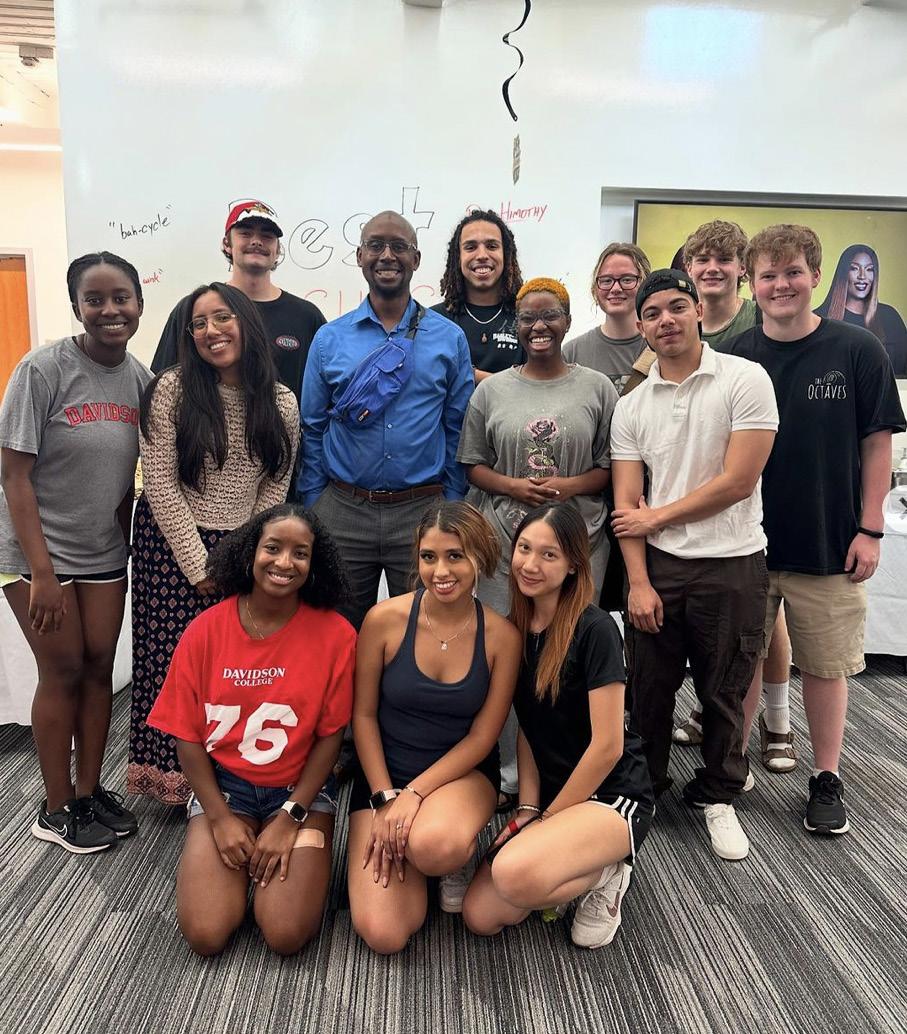
Snipes was also a firm advocate for LGBTQ+ inclusion on campus. “[Snipes] personally reached out to me [before the semester started] to talk about the fact that Davidson accepts me and would acknowledge me and my identity, but just let me know that as an institution, all of its practices aren’t there yet in terms of bathrooms and rooming,” one first-year student who requested to remain anonymous said.
Snipes worked on many other projects at Davidson, including collaborating with the Student Government Association on community access, safe sex practices, and alcohol safety.
One of Snipes’s final initiatives was to increase campus accessibility by adding elevators to dorms. “Watts dormitory right now is being renovated to add an elevator that will help with accessibility needs. They’re going down dorm row right now in the coming years to add elevators to make all
dormitories accessible,” Przynosch said.
Snipes discussed how there are other initiatives that he would have liked to work on, such as a possible pickleball court and hammock stakes. “It’s just looking at those [student] experiences, both external and then internal. What are ways we can continue to create a sense of belonging in the residential spaces?” Snipes said.
While many would assume that Snipes’s departure could impact how RLO functions, this is not the case. “Most students probably won’t even notice this change. The only people I think will be largely impacted would be RAs and Hall Counselors,” Przynosch said.
Taylor hopes that the changes Snipes brought to RLO will continue to serve as staples for the office. “[Snipes] has hired and built a team within the Residence Life Office that will hold and maintain his values and practices so that the ways in which he showed up for students will hopefully still be available,” Taylor said.
Kilpatrick also aims to improve RLO’s approach to student life by encouraging innovation. “I also hope that the next person that comes in challenges us as professionals on how we can bring new thought and energy into the processes that we do. But I truly hope that this is a person that really wants to help, and a person that really wants to be on the forefront of what is the latest and best practices in our field,” Kilpatrick said.
McQuillan-Krepps is aligned to the Residence Life Office’s mission of prioritizing students’ needs. “That’s my goal of coming to this, because it’s not about me and my career, and it’s not about my agenda [...] What is it that the students need [and] what is it that the college needs? What is it that we need to provide a quality student experience?” McQuillan-Krepps said.
Still, Snipes knows that Davidson’s RLO will encourage the same empathetic approach he sought to embody after he has left. “The currency here is genuine relationships. That’s the currency to get things done at Davidson. But it’s also kind of the heartbeat and driving force,” Snipes emphasized. This mindset also applies to the search for a permanent replacement. “It’s about finding the candidate who’s gonna be best for Davidsonians, who’s going to center [student] experiences, [and] who’s also going to understand that it’s all about relationships,” McQuillan-Krepps said.
STAFF WRITER
On Tuesday, September 24th, the Duke Family Performance Hall buzzed with an audience united in its enthusiasm for bipartisan dialogue. Students, faculty, staff, and guests with diverse political perspectives gathered to experience a live session of the You Might be Right podcast, co-hosted by former Tennessee Governors Phil Bredesen and Bill Haslam. Hosted by the Howard H. Baker Jr. School of Public Policy and Public Affairs at the University of Tennessee, the You Might Be Right podcast fosters bipartisan conversations around issues of national importance. Bredesen, a member of the Democratic Party and Haslam, a member of the Republican Party, invite different guests every episode to be the medium for bipartisan dialogue.
The guests for this episode of the podcast, held at Davidson College, were Anthony Foxx ‘93 and Margaret Spellings, with the Dean of the Baker School, Dr. Marianne Wanamaker, attending as an audience member.
In addition to being a Davidson Alum, a member of the Democratic Party, and the 17th U.S. Secretary of Transportation, Foxx was also the first Black Student Body Presi-
dent at Davidson College, the 54th Mayor of Charlotte, and served with Haslam under the Obama Administration. Foxx is currently the Co-Director of the Center for Public Leadership and the Emma Bloomberg Professor of the Practice of Public Leadership at the Harvard Kennedy School. Spellings is currently the President and CEO of the Bipartisan Policy Center and served as the 8th U.S. Secretary of Education and White House Domestic Policy Advisor under George W. Bush’s administration.
After President Doug Hicks’s introduction, in which he emphasized Davidson’s theme of “Building a Community of Trust,” and the introduction of the podcast’s guests by Bredesen and Haslam, the speakers launched into a discussion tackling the challenge of polarization in the United States.
Embodying the spirit of a respectful and transparent discourse, both Foxx and Spellings presented their own views on matters of policy and conduct in the White House, Washington, D.C., and the United States at large.
On the question of what public service looks like when partisanship and polarization invade the work local leaders are trying to do, Spellings mentioned inertia at the White House. “It means nothing [...] is happening until it is an emergency situation,” Spellings said. “Reg-
ular order, regular amendments and debates, grinding through the issues doesn’t happen like it is supposed to.”
Foxx, in agreement, added his own input to the matter by mentioning that even though there are subjects, like infrastructure, on which strong bipartisan consensus is visible, it gets muddy and more partisan when it boils down to the details, such as how to pay for that infrastructure.
Foxx noted that the Supreme Court’s decision to overturn the Chevron doctrine, which grants federal agencies the ability to implement their own regulations, will be impactful. “We are in a long period of significant disruption in the process of legislation.”
Based on the Chevron decision, Foxx argued that many ordinary practices will be subject to questioning and will take decisions out of the hands of agencies that are set up to deal with specific issues, deconstructing what has been built over time.
To that point, Spellings emphasized that the other potential outcome would be an effective coming together of Congress “to do their job.”
The subject matter that Foxx and Spellings agreed most consistently on throughout the podcast was the importance of networking and connections.
“We worked immediately with Ted Kennedy
[on the No Child Left Behind Act],” Spellings said. “And made friends with him and cultivated those relationships week after week.”
On a similar note, while talking about his work on the Fixing America’s Surface Transportation (FAST) Act of 2015, Foxx mentioned that they visited districts all across the country, went to the public and made a case for the legislation.
“As Americans, we underestimate the degree to which our similarities are much greater than our differences,” Foxx said. “Knowledge of how to analyze policy does not override being a human being and learning how to connect with people. It is a fundamental skill that we have to begin instilling in students.”
On the question of what can be done better, Spellings asked that individuals be better consumers and hold elected officials accountable. Foxx asked individuals to not be afraid of collaborating with people who have a different political stance.
When asked why this bipartisan dialogue is important for Davidson students, Jay Pfeifer, the Director of Media Relations at Davidson College, agreed with the sentiment relayed by
CONTINUED ON PAGE 2
CLAIRE KELLY (SHE/HER) CO-EDITOR-IN-CHIEF
If you were to walk from Midwestern Pennsylvania to the Nevada/California border, you would have crossed through the Amazon rainforest. Covering 1.6 billion acres, the Amazon is home to nearly three million Indigenous people, with a mixture of different languages, customs, and cultures across large cities and smaller communities alike. In a talk hosted by the Dean Rusk International Studies Program and cosponsored by the Pulitzer Center on September 23rd, journalist Fernanda Wenzel, joined by members of the Davidson community, recalled her investigation into how deforestation has affected her home country of Brazil. The deforestation of non-designated public lands has become a prevalent issue in recent years, especially with nearly 20% of the Amazon being lost due to deforestation or other climate-related issues in the last fifty years, according to a study done by the Council on Foreign Relations.
Wenzel, who is currently a writer for Mongabay—a nonprofit media outlet that covers climate and biodiversityrelated issues—has always been deeply rooted within climate awareness. “My grandfather was a beekeeper; I grew up in the countryside and my family used to go camping a lot [...] After I started working with the rainforest I realized it actually has a lot to do with my roots back home,” she stated over WhatsApp.
Prior to her Pulitzer Center project, Wenzel carried out fieldwork regarding illegal ranchers and their involvement with extractivists, traditional people who work with products from the forest like açaí. “I think the most exciting [journalism story] was my first fieldwork in the Amazon. I went to this conservation unit in [the] Rondônia state where extractivists were being expelled by illegal ranchers. I realized I had so much to learn,” Wenzel stated.
“I was the first reporter writing about this conservation unit, and I am proud to say I put it on the agenda. Since then, many other reporters have been writing about the violence against this traditional community. [...] Unfortunately, at this point almost all [of the] area has already been deforested.”
When Wenzel started her year-long investigation with the Pulitzer Center in 2022, she set out with the goal of learning the intricacies behind professional land grabbing, the process of illegally buying or leasing large-scale land acquisitions. “I didn’t want to talk about some amateur that does a small area [...] and never does it again. I wanted to talk about people that do it all the time on an industrial basis,” Wenzel stated in her talk.
“To do that, you have to have a lot of money, because [making land purchases] in the Amazon is very expensive [...] So I realized that if I want to go after the big guys, I had to go after big deforestation.”
Much of the deforestation that has occurred in recent years was enabled by former Brazilian President Jair Bolsonaro. Under his administration from 2019-2022, deforestation surged, according to studies done by Carbon Brief. Many illicit land purchases made by deforesters were done through a jurisdiction form called the Rural Environment Register (CAR), which was initially created to try and improve the environmental control of rural properties in Brazil. To fill
out a CAR, one simply has to say that they own land as part of their farm or property. From there, the government is supposed to confirm that the information is correct. This confirmation, however, rarely happens.
“The problem is that it never happens; it’s a self [submitted] document [...] I can say I have a farm anywhere in Brazil, and I have a document saying that I have this land, but it may not be true. So that’s why this document became interesting for land grabbers,” Wenzel stated.
She also added how political pressure plays a significant role in these processes. “These [land grabbers] feel very reassured by politicians who defend their interests at local and national levels.” Wenzel expressed.
Frontis W. Johnston Associate Professor of Political Science Katherine Bersch further inquired as to how protected lands function in Brazil, asking to what extent is there land grabbing and how is it that these areas are protected.
“There are a lot of people that [...] don’t want to see these areas being protected,” Wenzel responded. “By far the most protected areas in Amazon are Conservation Units and Indigenous territories, [...] so that’s why land grabbers usually prefer to go to undesignated lands, because it’s much more simple.”
After she learned how CAR documents function, Wenzel began to search for the people responsible for destroying parts of the Amazon. “I got three names, these two guys: Augustinho Alba and Delmir José Alba were brothers, and a third guy named Jeferson de Andrade Rodrigues. But I need to know more about these guys, because in the Amazon, it’s very common for the deforesters to use fronts,” Wenzel said. She soon discovered through social media platforms revealing information about them through seemingly innocuous posts on Facebook. “I found on Facebook that Delmir [...] had sponsored the biggest rodeo [...] in the community, and usually the face for [these kinds] of things are the most important people in the community. So with all this information I saw, it makes sense that these guys are behind the deforestation.”
Money is a strong motive for these land grabbers, as Wenzel learned through local sources on the ground. “I could estimate that [the land grabbers] spent around $2.3 million dollars during the deforestation, but if they decide to sell this land [...] they will sell it for $17.5 million, so we are talking about a profit of more than $15 million,” Wenzel explained. Unfortunately, Wenzel also described over the phone that these actions go beyond just monetary motives, and are rooted in larger issues within Brazil. “Many of them have been doing that [land grabbing] for a long time and they are not willing to change it. Economic reasons play a role too, since they don’t know how to make a living from [activities other] than logging, cattle ranching or illegal gold mining. And even if they were willing to learn new things [...] it is really hard to find public or private financing [for] these sustainable activities.”
Wenzel asserted that this is not just a Brazilian problem and that these atrocities can have negative effects on an international level due to the ongoing climate crisis. “71.5 billion metric tons of carbon—that’s the estimated [amount] of carbon that the Amazon stores. [...] That’s how important [the] Amazon is,” Wenzel declared. “But at the same time, the Amazon can be a large carbon emitter if we start to destroy it.
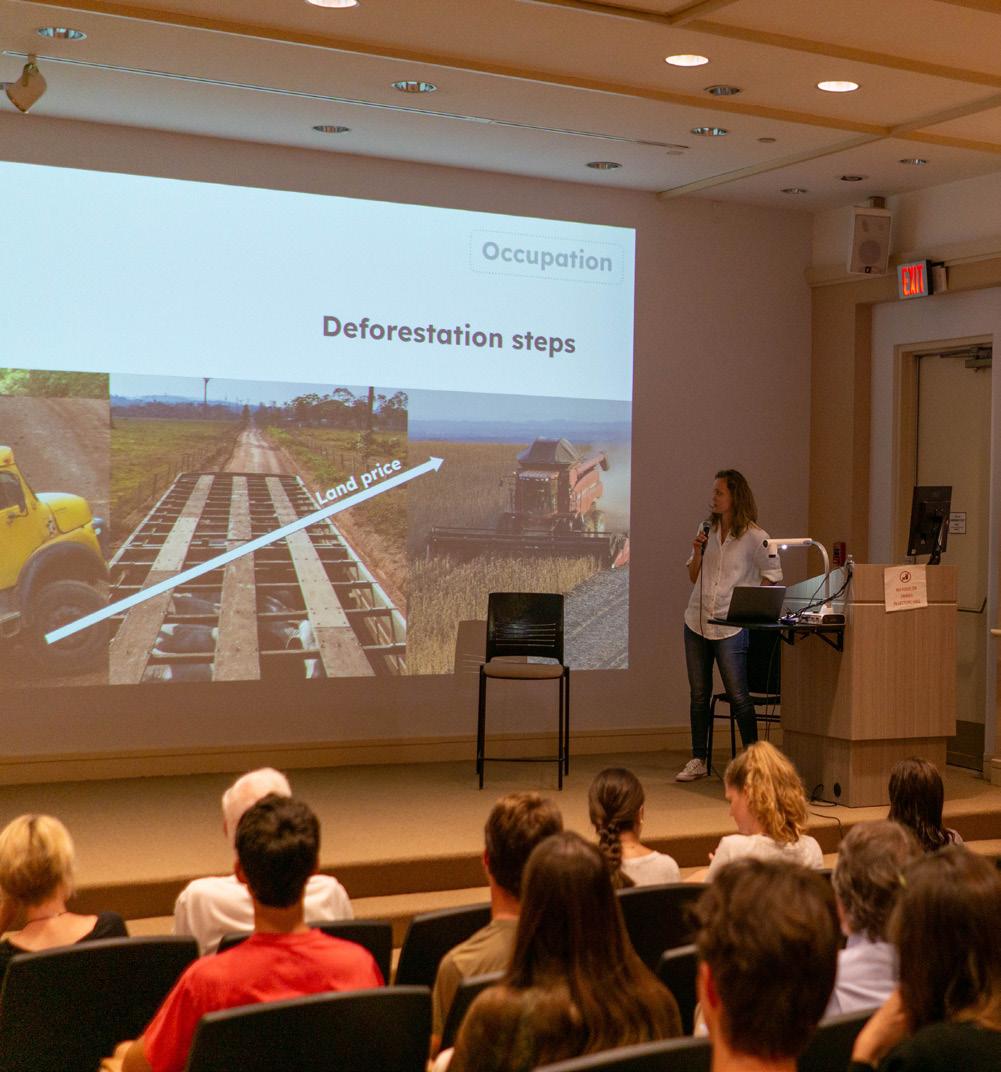
So when the Amazon burns, [...] it starts to emit carbon into the atmosphere.”
Students who attended the discussion felt they had much to learn from Wenzel. Megan Mokriski ‘25 was originally drawn to the talk for her Conservation Biology course, where they learn about biodiversity in the tropics. Despite prior knowledge, Mokriski emphasized how she learned of the complexities that come with deforestation in a country like Brazil, and how the challenges stretch beyond simply the environmental impact.
“I learned a lot more about current events in Brazil; [...] I didn’t know anything about government and power,” Mokriski stated. “I think she did a good job simplifying it down to the main things that she could talk about; [...] it was obvious that she knew so much about it, and she was really passionate about it.”
Looking forward, Wenzel is excited to keep diving into topics she is passionate about, including an upcoming project on the effects of mercury contamination on Indigenous women and newborns. “I should be traveling for the Munduruku Indigenous land in November to do this work,” she stated.
Amidst the investigation, Wenzel emphasized that the value of on the ground reporting stories are the visible outcomes.
“Both Rodrigues and Delmir took responsibility for the largest continuous deforestation in a statement to the Civil Police, given in June 2020,” Wenzel wrote in her article for the Pulitzer Center.
On a larger scale, Wenzel’s impact from her project extended to the deforesters themselves. After her story was published in early 2023, the federal police in Brazil underwent an operation that was carried out this past June. This resulted in further investigation into the men Wenzel researched. “That’s why we work. It’s very rewarding when something like that happens,” she stated.
CONTINUED FROM PAGE 1
Foxx. “There is a lot more that connects us than divides us,” Pfeifer said.
“It is easy to lose sight of that and I am hopeful that events like these can help us remember [...] that we can all be better neighbors and work better together.”
Both the guests and hosts left sage advice for Davidson students to build upon, especially for students looking to pursue careers similar to those of Foxx and Spellings. The most common one was to build friendships.
“Not everyone’s going to agree with you perfectly, very few are, [so] just having some kind of personal relationship outside of the conversation around the particular issue at hand helps enormously,” Bredesen said. The speakers touched on several other critical components of serving in office. From
the vulnerability of having a publicly exposed life to discussing the importance of being persistent and finding different ways to do one’s task when boxed out, Bredesen, Haslam, Foxx and Spellings consistently emphasized the importance of a transparent, mutually beneficial dialogue that, instead of being indifferent to the other side’s perspective, built upon common experiences and grounds for connection.
With his closing remarks, Haslam empathized with his audience, understanding the frustration and exhaustion the current polarized political climate of the United States can bring about. “But the wrong response [to this situation],” Haslam said, “is to give up. [Because] politics is not a spectator sport. It matters too much.”
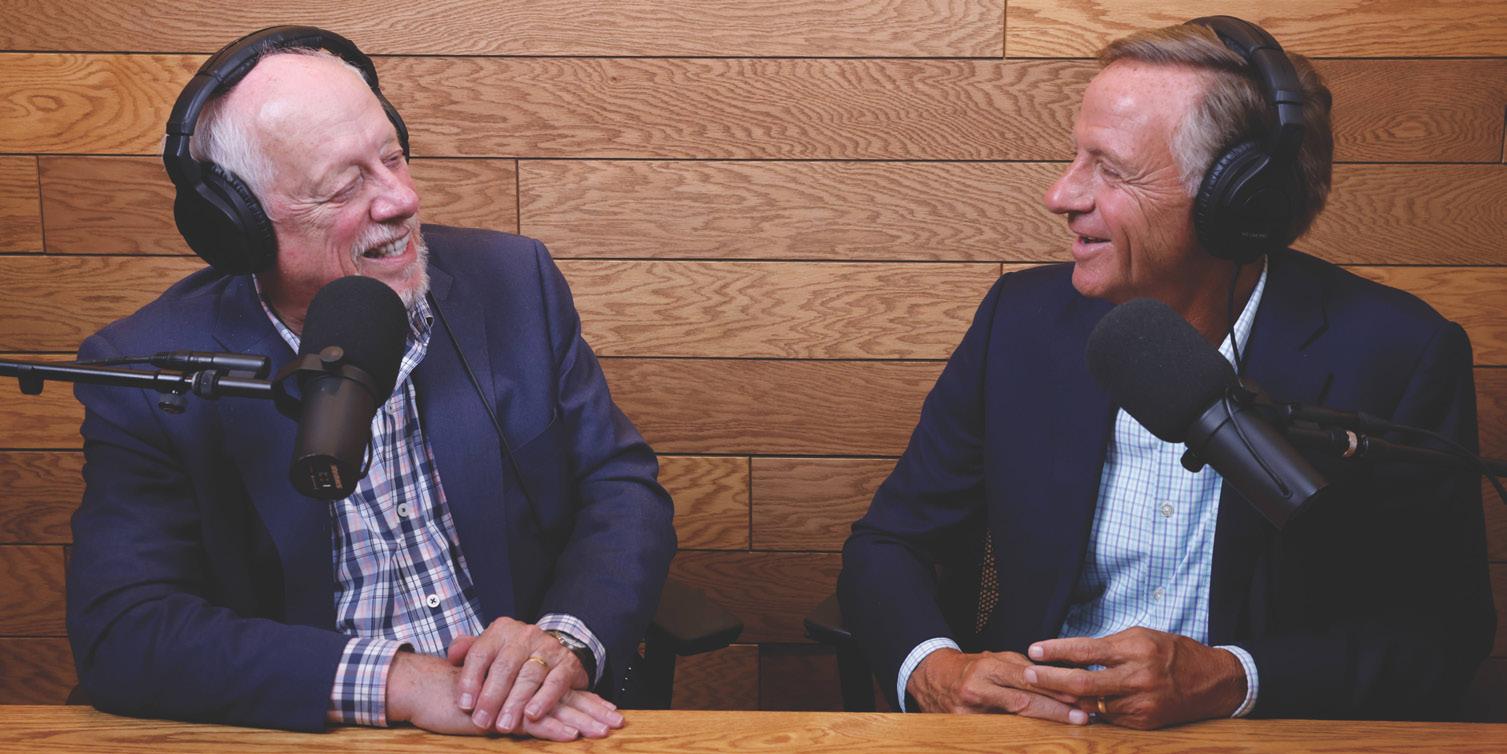
SAVANNAH
EDITOR
As North Carolina prepares for a hotly contested governor’s race this November, voters across the state must now grapple with dozens of disturbing comments posted years ago on an online pornography forum by Lieutenant Governor and Republican gubernatorial nominee Mark Robinson.
News of Robinson’s online excursions came into public view after a CNN KFile investigation, published on September 19th, linked Robinson to comments made on an online porn forum called Nude Africa. Robinson allegedly declared, “I’m a Black NAZI!” and recounted stories of secretly “peeping” on women in public gym showers.
Robinson made countless other lewd and sexual comments between 2008 and 2012 before he made his political debut in 2020. While many of the messages were left under a username, “minisoldr,” his full name was listed on his account, as well as his email address.
Despite the evidence compiled by CNN, such as aligning biographical location, personal information, and email address, Robinson denies any link between him and the comments made on Nude Africa, denouncing the allegations as “salacious tabloid lies.”
Since his political ascendancy, Robinson has made numerous other controversial statements, including mocking victims of school shootings and making derogatory comments towards the civil rights movement, according to The New York Times.
To many, the latest revelations only add fuel to long-standing concerns about Robinson’s beliefs. “I was offended that a person with these views is an elected representative for me as a North Carolinian and that they were given a larger platform as a gubernatorial candidate, and concerned that they might be given more power if they were to win the race for governor,”
Associate Professor of Political Science Dr. Melody CrowderMeyer said.
Robinson’s denials have failed to assuage the concerns of political organizations across the state, which are abandoning previous endorsements. Though they have yet to release an official statement, the Davidson College Republicans is one such group.
“We had a policy of sticking with [and] attempting to defend
the choice of the party, but these developments have made it clear he cannot be supported,” Davidson College Republicans President Stephen Walker ‘26 said in an email. “Our goal is to support the other candidates on the Republican ticket who have what it takes to lead and deliver results for the people of this state and across the country.”
Despite growing negative press and a shrinking team–over ten high-ranking staffers quit by October 1–Robinson plans to remain in the race.
Associate Professor of Political Science Dr. Andrew O’Geen speculates that Robinson might believe he can still contest the gubernatorial election. “Partisan identity is a really strong factor in people’s vote choices, and it takes a lot to knock someone off of that path,” Dr. O’Geen said.
“It might be the case that he and his people are doing some kind of calculation that says, ‘if we just deny this thing and sort of obfuscate until the election, there’s a population of people that are going to vote for us no matter what and we still have a chance to make it close or win this election,’” Dr. O’Geen continued.
Two recent polls by the Washington Post and East Carolina University report Robinson trailing Democratic gubernatorial candidate, North Carolina Attorney General Josh Stein, by 16%. Some speculate that Robinson’s insistence on staying in the gubernatorial race might impact Republican candidates across the ballot this November.
“By staying in the race, Robinson makes possible a reversecoattails effect–that voters who do not want to vote for him will also then not vote for other Republicans on their ballot or choose not to vote at all,” Dr. Crowder-Meyer said.
Though possible, the odds of Robinson damaging other Republicans are low. “While Robinson’s popularity has dropped dramatically in recent polling [...] there is not much evidence presently that this scandal is reducing voter support for the Republican presidential candidate [...] I do not expect this will substantially affect the outcomes in other races,” Dr. Crowder-Meyer said.
Nevertheless, Walker believes the best way for Republicans to minimize their losses in the upcoming election is to distance themselves from Robinson. “If Robinson does the right thing and gets out of the way of our other candidates, I am confident the party will recover by refocusing on our positive candidates and policies,” Walker said.
Robinson’s comments may bode well for Stein’s campaign and Democrats across the ballot. “When something like this happens pretty close to the election, it does mobilize more
Have you ever taken a look at congressional maps across the U.S.? What about the State House and State Senate maps? If you did, you may see some odd shapes here and there. While the shapes might look fun, what you are witnessing is extremely dangerous. A trend that has existed for decades is finally beginning to reach its ultimate conclusion. I am of course talking about gerrymandering, the very legal and very legislative election rigging that Republicans have been doing for years.
Republicans may complain that Democrats also participate in gerrymandering. This is true, but every data point we have says one thing clearly: Republicans do it a lot more. [Editor’s Note: While Republicans did gain a significant advantage through gerrymandering in the past, recent data suggests that the national-level impact has diminished.]
Too many Republicans have gotten comfortable with this reality. If winning through any legal means becomes your bar, with no underlying moral prescription, then any tactic becomes the best one. The worst part is that every part of the plan is out in the open.
Step 1: Create panic. Have people report stories ranging from dead people and undocumented individuals voting to fraudulent mail-in ballots.
Step 2: Double down. Have politicians and allies constantly deny the overwhelming evidence from courts, local police, the FBI, journalists and even the very people who made the initial claims.
Step 3: Justify the reaction. Have your political buddies pass laws making it harder to get IDs, register to vote, vote in person,
and vote absentee. Make sure these policies have a disproportionate impact on lower income and POC communities. Use the recent “voter fraud” as proof as to why these moves are needed, despite people who literally work in cyber and voter security saying otherwise.
Step 4: Draw the maps. With your newfound power, use the legislative to draw skewed maps that make a purple state have both a solidly red State House and Senate. And make sure to keep the State Supreme Court red so they won’t stop you.
Step 5: Cry hard. When all else fails and you still lose elections, don’t go down silently. Challenge technical details in court while publicly stating you’re challenging massive voter fraud. Stack voting sites and state election boards with election deniers. Make phone calls to governors, attorney generals and congressional allies. Tell people that the election is being stolen from you. And hope, under all this unforeseen pressure, the system breaks, and you gain power anyway. The only way for us to fight this is to call it out every step of the way. Do not become complacent. Every right you have can be taken if you are not paying close enough attention. Check your registration. Vote in person. Vote early. Tell friends and family to do the same. We the people get to choose those who govern us, but I guess Donald Trump needs a reminder.
Macon-Goudeau
-Kailliou
On behalf of the Davidson College Democrats
people to vote […] and I think that it could be a good thing for the Democrats,” Center for Political Engagement President Sophia Ludt ‘25 said.
Even so, Dr. O’Geen emphasizes that the gubernatorial election is not a foregone conclusion. Accordingly, it is important to consider what a Robinson victory would mean for North Carolina.
“If he wins after this story comes out [...] I think what you have in that situation is a real triumph of party identification. [...] It’s hard for me to imagine a world where every single Republican voter who decides to cast a vote for Robinson feels ambivalent or uncaring about that particular incident, and the idea that some of them are deeply offended by it, or find it deeply problematic, seems pretty obvious to me, and the fact that folks would be willing to overlook that [...] is evidence that would suggest that people’s party identification is exactly as strong as we think it is in terms of dictating their vote choice,” Dr. O’Geen said.
“In most elections, party identification will drive vote choice far above any other factor. I hope it will not outweigh voters’ consideration of the importance of protecting and bolstering American democracy,” Dr. Crowder-Meyer said. “The stakes in this election are very very high.”
Indeed, damaged trust in political institutions alone might take years to repair. “If [Robinson] is elected, and he’s perceived as illegitimate for whatever reason, then I think that damages peoples’ trust in the institutions. It damages the degree to which they’re going to look to government to help solve problems and it probably damages the relationship between the executive and the legislature in ways that probably will take a few years to correct,” Dr. O’Geen concluded.
Corrections from 9/25/24 Issue: We incorrectly referred to the Davidson College Young Americans for Freedom chapter as the Young America’s Foundation. Additionally, Cynthia Huang is a member of the class of 2026, not 2027.
What sets the American electoral system apart from those of the third world is the fundamental trust that citizens have in its ability to accurately reflect the will of the people. This trust is crucial; without it, faith in the broader system erodes, and the pride that underpins our democracy falters. It is clear that the integrity of our elections is vital for the health of the Republic. Americans must be confident that their votes are counted accurately and that fraudulent votes are eliminated. When a single illegitimate vote undermines the legitimate choices of hardworking citizens, the very foundation of our nation is threatened. Currently, a significant gap exists in our election laws. There are no federal requirements mandating proof of citizenship to vote, which raises serious concerns, especially given the influx of illegal aliens pouring in from the third world. Critics often downplay this issue of illegal voting as a statistical anomaly, labeling it as fear mongering by Republicans. However, recent reports from states such as Texas, Virginia, and Alabama have revealed that tens of thousands of non-citizens appear on combined voter rolls. In a competitive state like Virginia, these numbers could easily sway an election. [Editor’s Note: While some states have identified potential non-citizens on voter rolls, the numbers are significantly lower than “tens of thousands,” and many of those identified are likely eligible voters incorrectly flagged.]
In response, House Republicans, with support from former President Donald J. Trump, proposed legislation aimed at removing these criminal, non-citizen voters from voter registration lists and instituting
proof of citizenship for future registrations. Unfortunately, this bill was blocked by the Democrat-controlled Senate and the BidenHarris Administration, both of which argued that non-citizens are already prohibited from voting in federal elections. While this is true in theory, the lack of enforceable measures in practice creates a glaring loophole. It’s akin to a bank leaving the vault wide open while politely asking the criminal thieves to not steal; it is an invitation for fraud.
This situation has transformed the American electoral system, once a model for selfgovernment worldwide, into one riddled with doubts about its integrity. If we do not enforce basic verification measures to ensure that voters are who they claim to be, we risk losing the very foundation of our American republican process.
As we approach the next election cycle, it’s crucial to engage with these issues seriously. The next administration, particularly if it includes a return to Trump’s leadership, has pledged to address these electoral vulnerabilities. It is our duty as citizens to vote with awareness and urgency, ensuring that our voices are heard in a system that reflects our collective will as a people. Vote Trump like your life depends on it.
-Montgomery Krakovitz
On behalf of the Davidson College Republicans
This summer, the common read for the Class of 2028 was Robin Steinberg’s “The Courage of Compassion.” The book advocates for compassion and open-mindedness by encouraging everyone to understand that humans have lived different experiences. Steinberg’s text reinforced ideas I’ve held for a while, and as the 2024 presidential race continues to heat up and dominate news cycles, I’ve found myself thinking more and more about the growing divide between Republicans and Democrats. To put it bluntly, people are too entrenched in their views these days. And the primary reason is (stop me if you’ve heard this before) social media. It allows people to pick and choose every bit of media they consume and has made it easier than ever to cozy up with one’s own beliefs and to understand issues only from their side. There’s nothing more comforting than an echo chamber. But the same goes for national media outlets, who have abandoned impartial coverage in favor of unwavering support for the party to which they lean. It’s no secret NBC News skews liberal and Fox News leans conservative, and that’s not a problem. However, when Fox continues to espouse the idea that the 2020 election was illegitimate in the face of unbiased and even Republican sources, they’re not being as truthful and unbiased as they claim.
Politics have also shifted further away from policy this election. Both Davidson College Democrats President Kailliou Macon-Goudeau and Davidson College Republicans President Stephen Walker agree that character attacks and an increasing lack of civility have played a huge role in the partisan divide. This polarization has created an
environment where it’s easy to become stubborn for your candidate. At the same time, it’s hard to respect and understand both sides when presidential debates are akin to middle school playgrounds, with he-said she-said and insults flung back and forth. That’s no recipe for actually caring about policy and the things that I believe matter most for our country’s future.
So how do we try to bridge that widening gap between red and blue? I’m sure the majority of people reading this article have firm beliefs about the candidates this election, as do I, but try to understand the other side. At the risk of sounding too preachy, I highly recommend opening your mind to how the opposite party lives. If you’re voting for Harris, watch twenty minutes of a Fox program. If you’re a Trump supporter, read some political pieces from The New York Times. I don’t expect this to change minds, nor do I want it to, but these sources will shed light on why politics is not a one-sizefits-all industry.
Take immigration for example. I strongly believe that both America itself and our economy is built on the strength of outsiders and is first and foremost a melting pot nation. But as a college-educated man from a stable family, my background can be radically different from other Americans. My perspective is different from someone who may be in danger of losing their job, or who lives in an area crippled by fentanyl and other drugs coming across the border. So it’s unfair for me to believe that my opinion is necessarily correct and there’s no other way to look at it. Simply put, there’s no correct solution for immigration. The same goes for many issues. We can–and should –debate and feel strongly about our opinions. However, I believe we should not do so at the expense of delegitimizing others, because none of
MSBG. Turner email chain. Little Freak. These might sound like strangely strung together acronyms and phrases, but on Yik Yak, the popular pseudonymous social media app, they derive meaning. Within one short scroll on the app, users become immersed in Davidson-specific lingo and information. Content is only available to users within a certain vicinity of campus and the surrounding area. This allows members of the community to share information rapidly and learn about niche subjects concerning the school. Davidson College-specialized memes, comments, and shoutouts are amplified simply due to the acknowledgement and appreciation that everyone on campus is experiencing something similar. At its core, Yik Yak takes the shared space of a location and turns it into a medium of connection. In spite of all the various spaces that individuals occupy on this campus, we all share the larger space of Davidson College itself. Yik Yak honors this fact wholeheartedly.
Yik Yak on Davidson’s campus thrives in the context of notable events. So far this semester, one of the most active times on Yik Yak was during the campus-wide power outage on August 30th. There were constant swarths of posts joking about what caused the blackout, the effects of the power outage, and what people were getting up to in the meantime. One post jokingly stated, “Freshman don’t worry this happens every Thursday #Freshman Advice.” People often use these sorts of events to fit into typical Davidson “meme frameworks,” such as a sarcastic claim that Doug Hicks will use any situation to increase tuition. A Yik Yak user, posing as Doug Hicks, posted the following after the blackout: “Dear students and family, As I look out and see the trees and sun I’m reminded of the power of light. The light we bring to students and our students to the world. In an effort to keep this light, we are raising tuition 5%. Sincerely, Doug Hicks.” During the blackout, one user referenced the Yik Yak commonplace hatred directed toward the use
these complex issues are black-and-white. I’m proud to go to a school full of brilliant minds who can think critically, a skill we need in spades when it comes to political discourse. I hope to see that on display at the on-campus debate this month. Both the Davidson College Republicans and College Democrats agree; Walker says the debate exists for students to “[form] nuanced opinions for themselves,” while Macon-Goudeau says the debate gives us an opportunity to “engage honestly as a community.” But internalizing those words is a lot harder than just saying them. I challenge everyone to come to that debate with a truly open mind. I also challenge both political groups on campus to engage with each other outside of the debate in a setting where both are willing to have their ideas tested. Most Americans can acknowledge that the gap between parties has grown and express a desire to close that gap. Acting more civilly, having an open mind – these aren’t new concepts to most people reading this. However, the solution is, yet again, engaging in respectful dialogue. In order to fully understand a given issue, you must make an effort to hear from the other side. I encourage everyone reading to embrace people with different viewpoints, because only through challenging your own can you fully understand a given issue. So, go ahead and challenge yourself.
Asa McCaleb ‘28 is an undecided major from Dallas, TX and can be reached for comment at asmccaleb@davidson.edu.
of scooters on campus. This user posted, “Thankful this means none of the scooters will be charged tomorrow.” The intriguing part of these sorts of comments is that they provide an outlet for further conversation. Friends or strangers can reference these small comments, formulating moments of wholesome human contact. While there was evident sardonic commentary on Yik Yak during the power outage, there were also genuine updates as to how the situation was progressing. There is a duality that exists within the app: the spreading of useful information and constant jokes.
At the same time, Yik Yak exists as a linguistic reference point for Davidson culture. As stated before, MSBG (Middle School Biker Gang) is a widely discussed Davidson phenomenon on the app. This title has been given to a group of middle schoolers who often ride their bikes around campus. Perhaps most importantly, though, it’s a fascinating way to consider how language spreads around campus. Of course, individual friend groups have their own sayings and colloquialisms, but Yik Yak plays a crucial role in branding certain facets of our campus culture. Similarly, a groundhog who lives on the sloping hill next to Qdoba has been affectionately titled “Little Freak.” It seems plainly obvious to state that we, as a community, wouldn’t call these things the same name without the existence of a space like Yik Yak. These consistencies are dependent upon the unique form of communication that Yik Yak provides: an all-encompassing nearby broadcast to whomever wants to hear. Yik Yak, a resource of connection for Davidson students, can also beget alienation to students simultaneously. The anonymity of this app provides a space for people to state things they might not otherwise say to someone’s face. While the app does not allow for people to be called out by name, individuals are instead called out within the context of their actions, often quite specifically. On the surface, light-hearted labels for certain people on campus may seem inoffensive. However, the specificity of these titles can cruelly frame people through one aspect of their personality (which is ostensibly being ridiculed online by
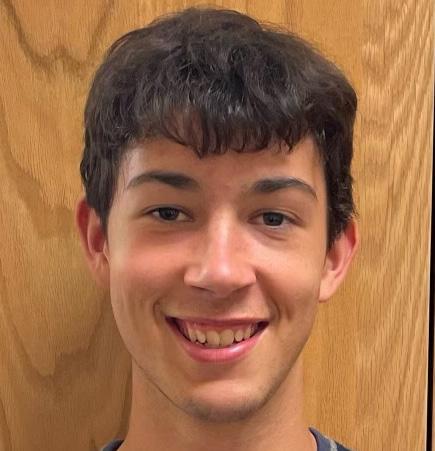
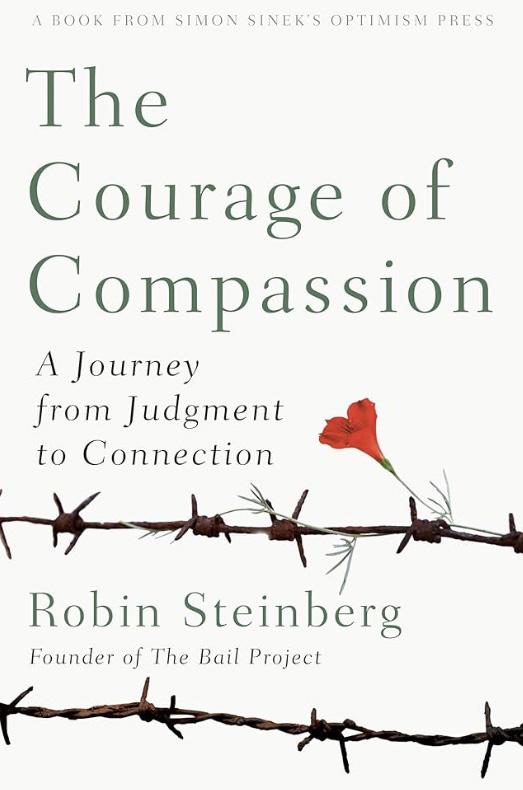
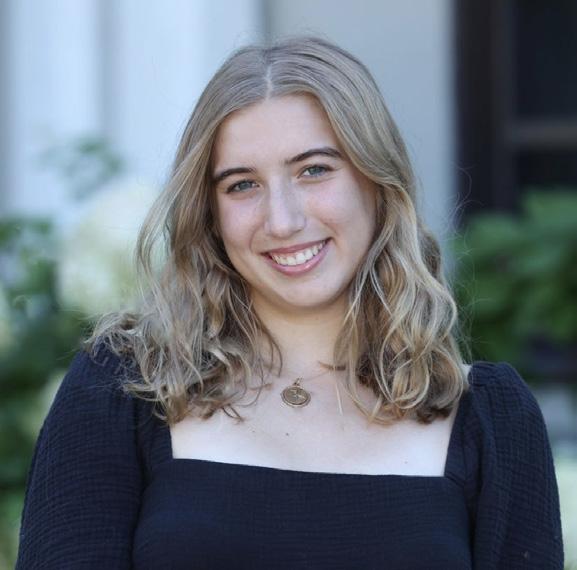
their peers). It is as if the whole community is gathering to point their fingers at once. This practice is plainly antithetical to a core principle that most Davidson College students adhere to, or at least strive for, on a daily basis: mutual respect for everyone in our community. Being conscientious about not contributing to this practice of “othering” is a mindset that more people should adopt while partaking in apps like Yik Yak. A simple downvote of a mean comment can go a long way toward preventing the spread of bullying.
In a strange way, Yik Yak is one of the most powerful tools for fostering community for students at Davidson. This is a bold claim, but it consistently reigns true as Yik Yak’s content continues to influence interactions and shared language on campus. This app operates as an impactful and lightly addictive channel to meet everyone where they literally are: Davidson College. To quote a recent post on the app, it’s important to resist the possibility of becoming “Yik Yak brain rotted.” However, immersing yourself in this space with the awareness that it has the potential to strengthen our ties with one another is a beautiful practice of connectivity. In both a frightening and endearing way, we are living in a Yik Yakified society. We shape Yik Yak and it in turn shapes us. Next time you find yourself scrolling, posting, upvoting, downvoting etc., simply acknowledge that you are influencing more than just an app: you are molding the very culture of the space around you.
Ireland
is an undecided major from Deerfield, IL and can be reached for comment at clireland@davidson.edu.
Despite their season reaching a busy midpoint, field hockey captains Abby Pompeo ‘25, Bella Worthington ‘25, and Macy Curtis ‘25 sat down with The Davidsonian to answer some get-to-know-you questions before the team enters the back half of their season.
Q: How did you first get into field hockey?
Pompeo: There’s not a ton of schools in North Carolina that have field hockey, and I luckily went to [a] school that had it. I [eventually had to decide] between that and cross country. My knees hurt when I ran, so I ended up doing field hockey, and I just kind of stayed with that.
Worthington: I first started playing [field hockey] in middle school back home in England, [where it] is a common sport in schools.
Curtis: I started playing field hockey in 7th grade. I grew up playing ice hockey in the winters. All my friends were playing field hockey in the fall and it had the word hockey in it so I figured I would give it a try too. It ended up being so fun, and I stuck with it!
Q: What is your favorite thing about playing field hockey at Davidson?
Pompeo: Definitely just being with the team. Coming into Davidson, I didn’t know many people, so having that immediate family and community was really helpful. I also get to play a sport I love, which is super fun.
Worthington: The team and seeing the progress we have made from my first year to now. I also like getting to see different parts of the US on away trips—as an international student, it’s usually places I’ve never been before.
Curtis: It gave me 25 immediate friends coming into college, and now we’re a completely different team of 25 and they are all my family so I’m super grateful for that. It has been a huge part of my college experience due to the time commitment it requires, but there’s really no other way I would want to be spending my time than playing with my best friends.
Q: Do you have any passions aside from field hockey?
Pompeo: I got into reading a lot recently, nothing too intense. [Author] Rebecca Ross right now is pretty good for me, but, [in terms of] classics, Suzanne Collins’s Hunger Games is hard to beat.
Worthington: I enjoy hiking and walking, especially when visiting new places. I always find it [is] the best way to get to know a new place.
Curtis: I’ve always been really interested in player development and understanding the many factors that play into performance. Because of this interest, I am a member of ‘Cats Stats at Davidson, and I think sports statistics are super interesting and helpful too.
Q: What is your favorite off-the-field memory from your time at Davidson so far?
Pompeo: [W]hen we go on away trips. I love going and seeing people’s houses and their families, and getting to see people off the field in a different atmosphere. One of the big [trips] for me was when we went to Maryland. We took a trip to the Orioles [Park]. One of [my] teammate’s dad dressed us up in all orange. We were on the jumbotron and everything!
Worthington: Going to volunteer at Continuing the Mission, a nonprofit which trains and provides service dogs for Veterans. Right now, they have three puppies we go and help with.
Curtis: My favorite off-field memory from Davidson was going to South Africa with my team. It was an incredible experience and to be able to go on that trip with my best friends is something I’ll remember forever.
Q: How does it feel to be a captain of the field hockey team?
Pompeo: It’s really an honor. We vote on it as a team, so having people trust me to lead them and be their voice is really powerful. I’m really grateful that I’ve been able to do that throughout the past three years.
Worthington: I’m excited to be a captain this year and work with Abby and Macy to help us achieve our goals. Every person on the team plays an equally important role.
At the end of her interview, Pompeo emphasized the goals and attitudes of the three co-captains for this season. “I think the team I came onto as a freshman is so different from [how] I’m leaving it, and I’m proud of where we’ve come from. We’ve completely changed the culture. We’ve changed the perception, I think, of Davidson field hockey. I’m already proud, but I want to leave it on a high note.”
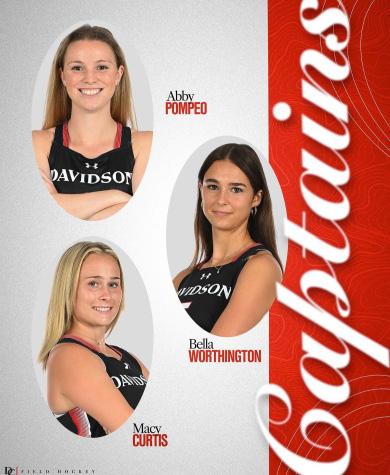
Curtis: Being a captain is an amazing responsibility given [to me] by my team and coaches. I feel lucky to have the opportunity with Abby and Bella to lead the team places we haven’t been before. I think our team is really special [because of] our leadership and culture.
The Davidson men’s golf team teed off its 2024-25 season with a win at the River Run Collegiate on September 16th and 17th. The Wildcats entered Tuesday’s second round in fourth place among eleven teams but rallied behind impressive day two outings from Joshua Stewart ‘25, Will Davis ‘25, and Davis Sayman ‘27 to claim the victory.
The event was shortened to thirty-six holes due to a tropical storm creating unplayable conditions. Davis expressed his pride in the team’s grit through the circumstances. “We had to battle,” he remarked. “We didn’t play that great at first, but we were able to ride the second day and come back and win.”
Coach Tim Straub referenced the team’s preparation as the key to their success. “They worked really hard in the weeks leading up to [the tournament] and were ready to play.”
Stewart led the way for Davidson, posting a round one score of seventy-two, which he followed with an impressive sixty-eight in the second round. This performance earned him his first career individual win and Atlantic 10 Golfer of the Week honors. Just behind Stewart, Davis’s seventy-two, seventy-one score earned him second overall. However, it
was Sayman who stole the show on Tuesday. He followed up Monday’s disappointing performance by shooting sixtyseven in the second round, the lowest score of the tournament.
Coach Straub offered high praise for the sophomore from Charlotte. “It was great to see Davis Sayman bounce back with a spectacular second round,” Straub said.
Last season was a disappointing finish for the Wildcats. The men came up short in 2024 in their quest for a fourth consecutive conference title. However, the objective remains the same as always for 2025: “the goal should be to win the A-10 again,” Davis said. Coach Straub echoed the sentiment
of his senior leader. “I don’t think much changes. We’ll go about it the same way. We’ll prepare and work hard all year long, and try to build our confidence in all these tournaments. I think we were in the fight last year, and I expect us to be in the fight again this year.”
Aspirations for the season extend beyond just a conference championship. Davis, who qualified for the Regional Championship as an individual, believes Davidson “can make another birth into regionals, and maybe make a run at nationals at some point.” An Atlantic 10 title would mean an automatic qualification for the ‘Cats to regionals and would mark their fifth regional appearance since 2018. While the men’s golf team has never qualified for NCAA nationals as a team, they have participated at NCAA regionals four times and have sent five individual competitors over the years, most recently Davis this past May.
After a four week break, Davidson is back in action October 14th at the Quebin Cup hosted by High Point at Sedgefield Country Club in Greensboro, followed by two more tournaments in quick succession to finish off the fall campaign. Coach Straub will have his team ready to add to its trophy case come April. “The team’s been on a great roll. We’re looking to continue our success again this year.”
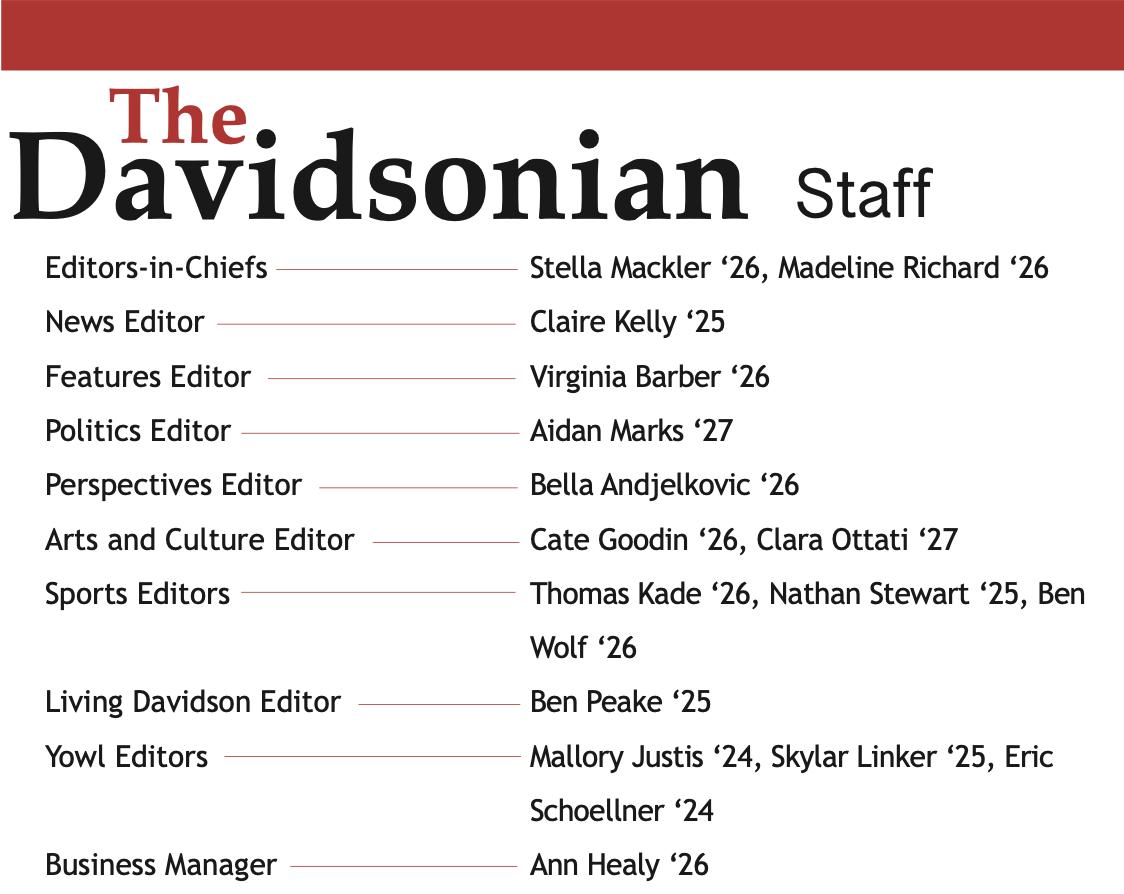
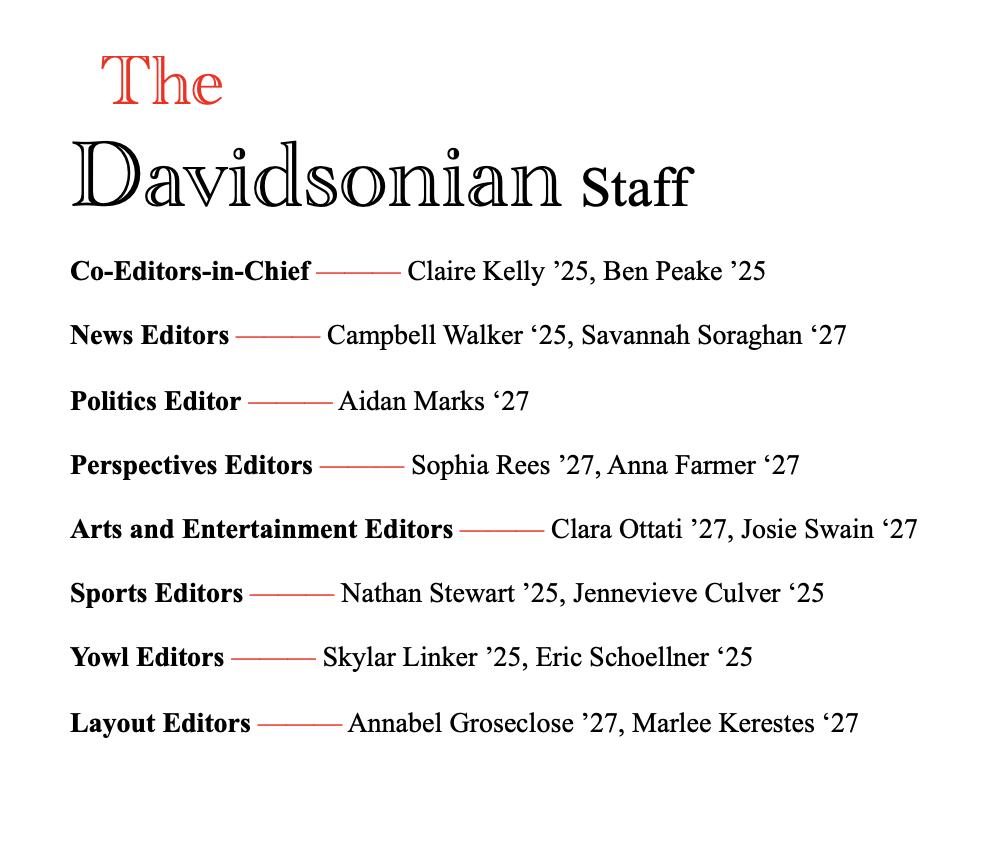
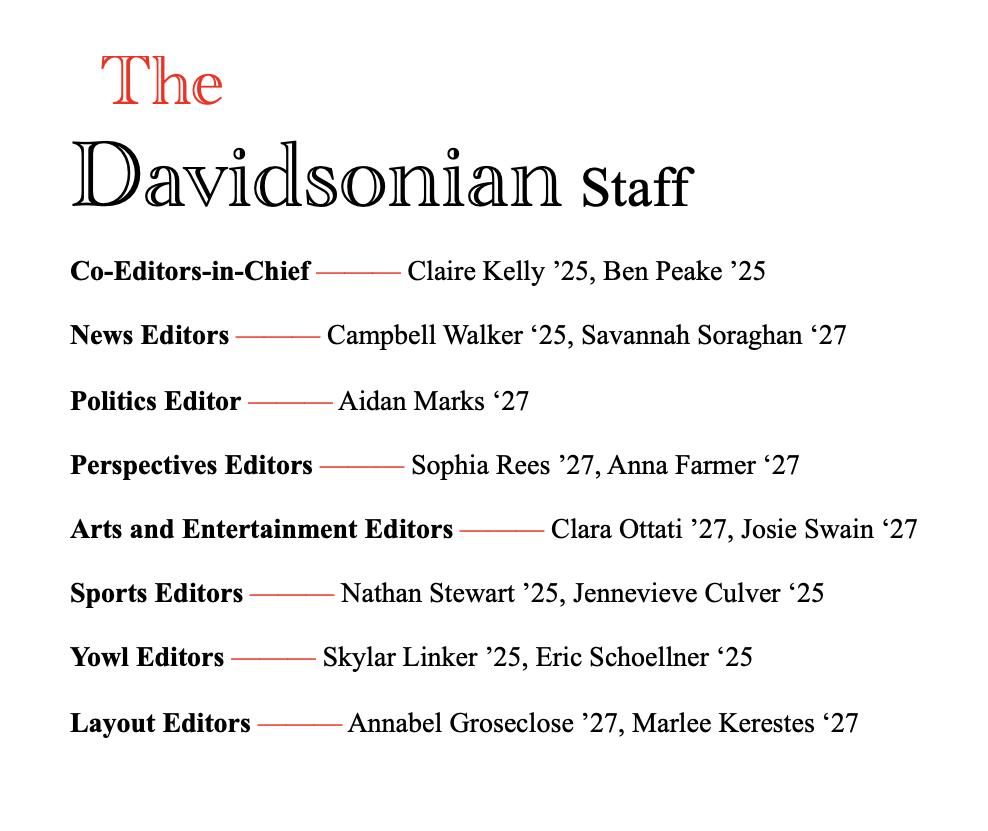
unique and fun environment to be part of.”
Przynosch explains the orchestra’s practice schedule: “We rehearse two days a week for two hours. We will rarely break off into sections where people rehearse in smaller instrument groups, so rehearsals are pretty much run with the full group, and we usually try to play through a song, and then we’ll stop
Batter Up! On the fourth Saturday of September, the Davidson Symphony Orchestra performed their first concert of the year. This sports-themed concert was called “Play Ball!” and showcased nine songs. Sports were the inspiration for iconic hits like “Gonna Fly Now” and “We Are the Champions.” Other pieces creatively included sports themes: two sports reporters called out live reactions to different sections of “Symphony No. 5 in C minor” by Beethoven. In a surprise performance, President Doug Hicks even made his debut on the keys during “Chariots of Fire.”
Abigail Przynosch ‘27, first chair oboist, has played in orchestras since the sixth grade. She knew she wanted to continue playing at Davidson and auditioned the first week of classes her freshman year. “It was something that I knew I wanted to keep doing in college, just because it gives me a really nice break from academics,” she explained. “The oboe is definitely a difficult instrument, but it challenges my brain in a way that academics don’t.”
Dante Falzone ‘27 values the community that the orchestra creates. He has been playing the violin since he was seven, and likes the unique musical opportunities the orchestra grants him, such as when he played alongside the Chinese erhu, a “stringed instrument that is very cool and very hard to play,” he stated. “Playing with my friends makes it [the experience] special,” Falzone remarked after the concert.
Przynosch enjoys playing with new members, and reflects on the unique talents each student brings to their community.
“There was a senior who played the harp last year, which was really cool since I’d never played with a student harpist before,” she said.
When there is not a student who plays an essential instrument, Davidson will find talent from the greater community. Przynosch has enjoyed this aspect of orchestra too. “Before coming to college, I had only really played with people that were my age, because I was in Youth Symphonies, so it’s been cool to play with adults [from the Davidson community],” she said. “They’re not full time musicians, but they are there because they really like it, and it’s a break in their day for them. So because we have those same attitudes, I think it fosters a really
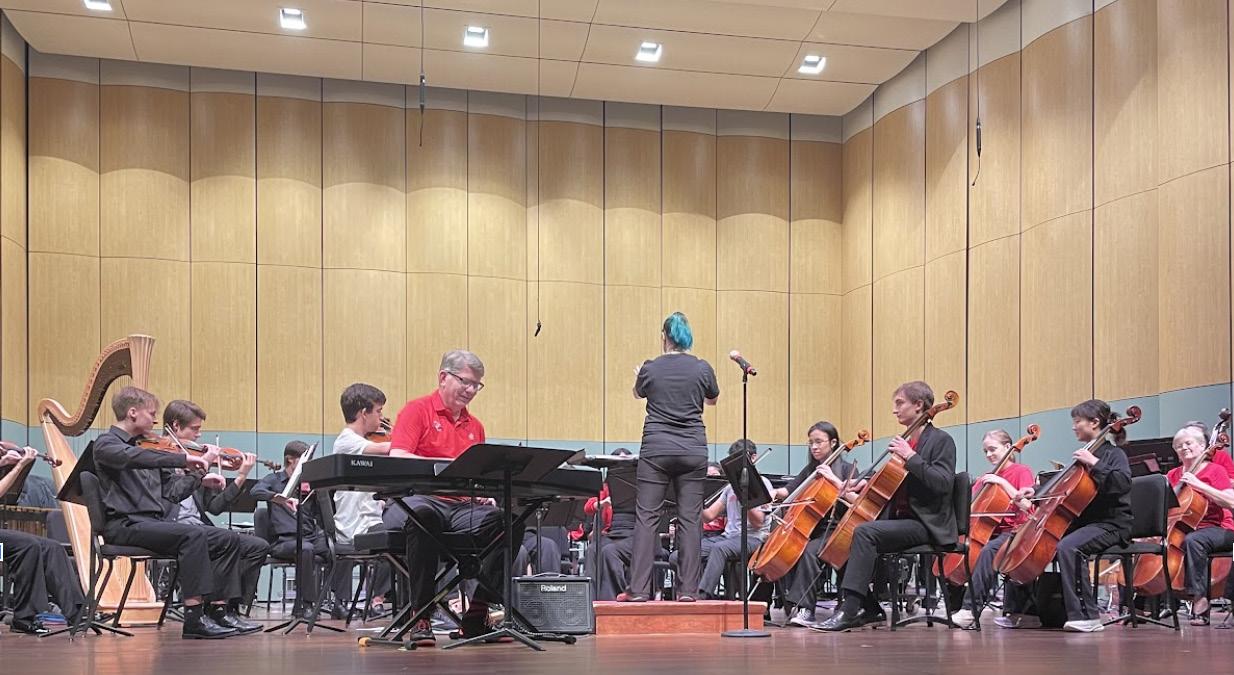
at different spots, work on transitions, intonation, tones, and other aspects of the piece.” Their cohesive talent was apparent. “I knew some of my friends were in orchestra, but going to this concert really showed me just how cool they are. Dante jamming out on the violin, Abigail killing it with her oboe, Silas [Garrett ‘27] tearing it up with his cello [...] it was epic. It definitely made me wish I had stuck with trumpet after 5th grade band,” audience member Anna Farmer ‘27 said.
Concertgoer Kathleen Degnan ‘27 commented on one of the most notable moments for her. “My favorite song was ‘Momentum,’ which was written for a women’s soccer tournament and [...] was supposed to be a song they warmed up to.”
Farmer enjoyed watching her friends in their elements. “I thought it was super neat to see that two of my friends, Chloe [Wang ‘27] and Silas, are designated as ‘principal’ for their respective instruments, which I think basically means they are the best in their section. I love finding out the diverse ways in which my friends here at Davidson are talented, especially when they are so humble about their talent that I might not have
known if I hadn’t gone to the concert and seen it for myself.” Farmer also enjoyed the environment of the event. “I appreciated the casual nature of the concert. At one point, [Symphony Orchestra Director] Dr. Tara Keith even encouraged the audience to sing along to ‘Take Me Out to the Ball Game’[...],” she continued. “As someone who does not really frequent these sorts of events, the relaxed vibe made the concert that much more inviting and enjoyable.”
President Hicks’s contribution to the performance added a fun touch of school and community spirit. He made the audience laugh with his riveting singular note piano performance, and even took a selfie with the orchestra while on stage.
“I had never been to an orchestra [concert] before, so I was not really sure what to expect,” Degnan remarked. “I was blown away. It was so cool how all of the instruments worked together to create beautiful music. [...] You could tell how much each person on stage really wanted to be there and was passionate about their instrument.”
The orchestra has more concerts coming up for those who couldn’t make it on Saturday. Garrett, the principal cello player, especially enjoys the concerto exhibition, where “a flute, a piano, and trombone are selected to play in an exhibition, which will be in November. Everyone should come to their concert!” Another event, the Wildcat Weekend Music Department Ensemble Showcase, will be held on October 25th, and both Garrett and Falzone noted the excitement surrounding the Winter Gala.
Julia Richards ‘27 is an intended Education Studies and Hispanic Studies double major from Charleston, SC and can be reached for comment at jurichards@davidson.edu.
In honor of Banned Books Week, taking place from September 23rd to 29th, Davidson College hosted a collection of events to raise awareness on book censorship. According to the American Library Association, 4,240 separate book titles were targeted by book ban attempts in 2023. Established in 1982, Banned Books Week serves as a reminder that our freedom to read is under attack. The national theme of Banned Books Week this year was “Freed Between the Lines.”
On Monday October 23, Professor of English and Chair of Educational Studies Dr. Shireen Campbell hosted the headline event: “The Power of the Book: What Books Do-and Don’t Do-to Their Readers.” The program highlighted the dramatic uptick in censorship attempts in public schools and libraries across the nation.
Dr. Campbell shared that she has always had interest in censorship and has concerns about the dramatic increase in book challenges in the last few years. According to the American Library Association, there was a shift in the source of book removal requests. In 2021, parents were the primary challengers. In 2022 and 2023, however, many requests came from political activist groups. Dr. Campbell says she aims to “expose incorrect assumptions and prejudicial origins of the current book panic, thereby aiding efforts to resist legislative school library overreach in general and objections to specific books in particular.”
Dr. Campbell noted the books most commonly banned in the last year are “books by or about LGBTQIA+ characters or by [or] about people of color [...] but objections to books can include sexual content, sexual orientation, gender identity, cursing, drugs/alcohol, vio-
lence, and so on.”
Dr. Campbell feels that parents are worried that what their kids read will fundamentally damage their upbringing. “Those who want to make books unavailable seem literalist: they often conflate the presence of character behavior in a book with endorsement of the behavior.” She shared the example of a group who claims that Shakespeare’s Romeo and Juliet “could promote duels and suicide.” She explained how books are having their meanings misinterpreted, and parents are giving books
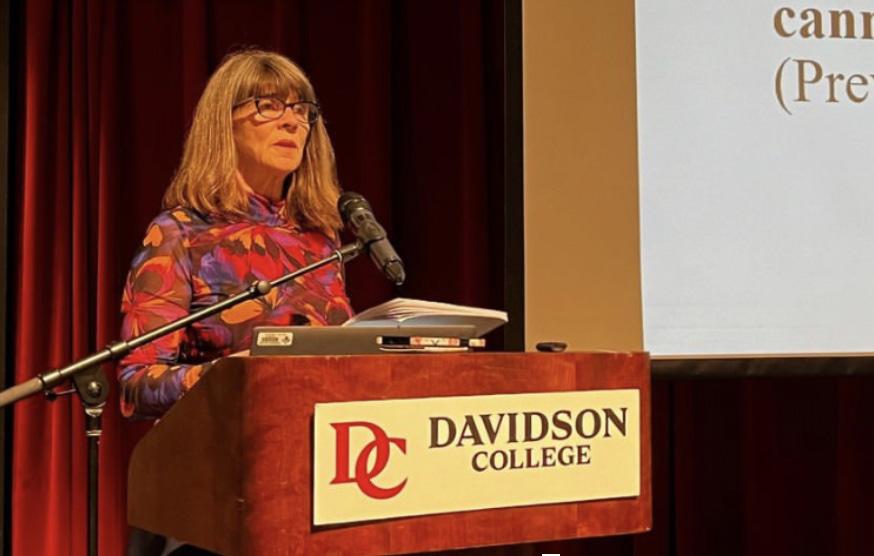
too much power.
In her program, Dr. Campbell emphasized the critical role that reading has on development, explaining that reading promotes empathy, literacy, and social cognitive benefits in kids. In addition, having access to culturally relevant literature increases interest in books and makes readers more empathetic. “Students are more likely to read when they have a wide range of books from which to choose, and students need books that address their lived realities as well as books that let them see other worlds. If you want to kill reading for fun, ban books,” Dr. Campbell said.
Addressing long-term implications, Dr. Campbell warned that poor literacy has lifelong consequences and will hinder a person’s
ability in the real world.
What can the Davidson community do about book banning? Dr. Campbell stresses the importance of staying vigilant and participating in local and state elections. If a candidate is promoting parental rights, or getting rid of “gender ideology” in schools, then they probably support book banning. She also recommended researching the pressure groups that are backing candidates, such as Moms for Liberty or Focus on the Family. Lastly, Dr. Campbell urges students to do their research. It’s crucial to form our own opinions instead of listening to biased claims. If someone is concerned about a book, find out why it is being censored and read it.
These events attracted Davidson students who have interest in learning about censorship. Those who attended shared their thoughts on the programs and why they believe Banned Books Week is important.
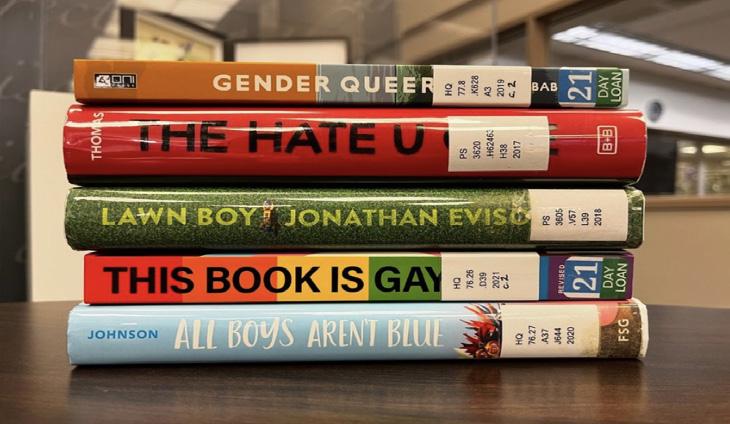
“Dr. Campbell’s talk was the perfect beginning to Banned Books Week because it provided an overview of why books have become such a hot button issue,” Audrey Bohlin ‘25 stated. “People from both sides of the political spectrum are using books as a scapegoat for everything they see as bad for children, which stems from conflicting points of view about
the purposes of reading.” She also shared that while she could not attend the other book banning events, she loves the idea of a silent banned book reading, as it “encourages people to read the banned books and piques curiosity.”
Clara Oyanguren ‘27 gave input on how books have impacted her. “Books helped me navigate my mental health struggles, my identity journey, and many other issues. I cannot imagine my personality or my views without the books I read and the perspectives they offered me,” she said. “It struck me when the lecture discussed how specifically topics like race and queer identities as ‘inappropriate.’ I found it telling that the studies mentioned show no definite evidence that supports this.”
She also shared that her favorite book growing up, The Perks of Being a Wallflower by Stephen Chbosk, is on the banned book lists. “It really struck me as a middle schooler to see Charlie’s journey going into high school. I saw so much of myself in him [...] I have ‘Perks’ to thank for my love of reading and writing—the novel made me want to be a writer.”
Nathan Stewart ‘25, who also attended Dr. Campbell’s discussion said “the greatest strength in something like Banned Books Week is the awareness it brings. Because book banning primarily occurs in elementary and middle schools, college students are not always privy to its threat. There is little that students can do, but awareness is paramount.” He finished by stating that “Dr. Campbell did a wonderful job of identifying the threat in banning books, as well as how ludicrous the action itself is.”
Annie Goldstein ‘28 is an undecided major from Charleston, SC and can be reached for comment at angoldstein@davidson.edu.
Thought school dances were just a high school thing? Well, think again. Social status markers never stop *face with steam from nose emoji*. Now take this quiz to find out if you’re a party pooper or a party pumper (new phrase brought to you by ChatGPT).
What did you wear?
First, how did you pregame Fall Fling?
A - By going to the “Play Ball!” orchestra concert ft. Doug Hicks, obviously.
B - Commons dinner, seven layer dip, and the Georgia-Alabama game.
C - You went over all the protocol documents and the SignUpGenius to look at your event responsibilities.
D - Total Wine & More and ABC trip with the friend group.
ANSWERS BELOW!
Mostly A’s:
You’re a sleepy sloth. You either didn’t show up at all or you walked in and half-heartedly shuffled on the dance floor while checking your phone the whole time. Put an L on your forehead and look in the mirror.
Mostly C’s:
You’re a Union Board laborer. You got there early and stayed late–but not for party reasons. Your night included swiping Cat Cards and putting wristbands on your drunk classmates while your BFFs partied like it was the end of the world.
How long did you stay at Fall Fling?
A - Maybe half an hour. Enough to make an appearance and be able to write a quiz about it.
B - Until the food ran out, or at least until the good food ran out.
C - The whole time. And you got there early. And you stayed after.
D - You showed up about an hour late. But you quickly made up for lost time with all the vibes you brought to the dance floor.
A - Your pajamas. You were preparing to go to bed before your friend dragged you out.
B - Whatever you had worn earlier that day. There’s no way you could risk getting sauce on a nice outfit.
C - A semi-formal outfit with a name tag.
D - A new, nice piece you had thrifted earlier that day.
How did you react to seeing your ex on the dance floor?
A - You don’t get out enough to have one.
B - You didn’t notice and didn’t care. You only had your eye on the real prize: the charcuterie board.
C - You pretended to look busy and important by sorting things on a table.
D - You partied even harder than you already were. They know what they’re missing.
Mostly B’s:
You’re a snack swiper. Let’s be real: that was the longest (and slowest) food line you’ve seen in a while. You showed up and hovered there the whole time. But you’re actually the smart one though, because all those smoked cheese bites saved you a trip to Cook Out later.
Mostly D’s:
You’re the ultimate boogie buster. You light up every room you walk into because you’re the life of the party. You spent the night busting it down, throwing it back, and putting your hands in the air like you just don’t care. We hope you had a speedy recovery the next day.

Charters and Bylaws:
The Charters and Bylaws Committee is preparing for an October 1st meeting to establish an “umbrella organization” for a cappella groups, similar to club sports or CPE, to approve a new constitution. Amendments will continue to be made if consensus is not reached at the meeting.
Food and Housing:
Time Reported Description/Location
09/24/24, 00:00 hrs
09/25/24, 13:45 hrs
Larceny Offenses: Misdemeanor larceny Duke, Further Investigation
Drug Offenses: Possession of Drug Paraphernalia Union, Inactive
Generated a list of FAQs for the new dining plan to create a social media video, and planned to meet with the new director of RLO to discuss expanding community access hours. Organizing a Hurricane Helene Relief Fundraiser with various campus organizations.
Accessibility and Student Affairs:
Discussed the long-term goal of increasing and assessing accessibility for campus buildings, and proposed a community event to create updated accessibility signs. Shuttle updates were also reviewed for fall break and campus transport.
Community Committee:
Coordinating meetings with various committees and administrators to discuss a community-focused Code of Responsibility event, while also exploring collaboration opportunities with PCC E-board and Common Ground for educational and community-focused events related to the Code of Responsibility.
Other Updates:
Lampus shuttles are postponed due to conditions at Lampus from Hurricane Helene. A survey was sent out to all students to provide feedback for SGA and guide our initiatives.
Irreverent student journalism since 2004. Castigat Ridendo Mores.
yowl.com/emailchain
Do You Call It Chidsey or New Dorm? What Your Answer Says About You Page Lingo
How Do Those Frat Guys Have So Much Free Time to Play Lawn Games?
Page 2.0 GPA
October 2, 2024
Breaking: Freshman Friend Group Somehow Has Elaborate Interpersonal Dating Drama Already Page Friendcest
Davidson Students Too Afraid of Conflict to Meet in Person, Only Have Arguments Via Outlook Page Reply All
The Throwback Politics Issue
Next Saturday Night Event: Leveling Out the Tilted Chidsey Parking Lot
Page Disappointing
One Must Imagine Sisyphus Enjoys Walking Up the Hill Everyday to Get to Class
Page Glute Burner
The absurd debate around the policy of this administration has again hit a wretched tone! How has no one had to answer for the lack of radical action in this New Deal? I say it does not go nearly far enough! Just two weeks ago, another man rallied against so-called cowards. I say, all that do not follow the vision of the Kingfish and the new New American Economic model are the real cowards themselves! Bring on the “Share Our Wealth” policy I say! Many of those on this very campus have more money than is simply good for a man to have, I must say. Time to put a wealth cap upon you! Even further, we need to implement a wealth tax on the clubs on this college campus. How on earth can something like a Games Club have over six figures? How does this blasted Union Board have so much money? Time to tell them they have enough money and tax everything over their dollar amount to go to less known but key clubs. I am sure there are actually useful organizations, but I cannot think of any. No matter! We shall create them ourselves if we must in another New Deal, but done properly. And again for that wealth cap, some students are too rich and some clubs order too much Domino’s pizza entirely! There is this talk of some grand conspiracy printed in this paper a couple weeks ago. I agree wholeheartedly! Those running standard oil have got to be properly dealt with and broken up. Too long have we let those blasted oil barons determine our policy. Forget the “Cult of Personality,” who shall have a better personality than the Kingfisher himself!? Old Huey Long shall give a right proper challenge
Rto that cowardly Roosevelt, who does not have the proper amount of gumption to put progressive policy in place. We talk of all this political violence, and yet I do not balk. Surely nothing bad will ever happen to this galavanting governor and the great Kingfish Huey Long, I am positively sure of it! Printing unnecessarily combative claims in the media has never once had consequences or increased the temperature of a situation to bring distrust or violence upon oneself. Trust in the vision of the Kingfish to truly challenge the ideals of these “progressives.”
Let me take away the money that you treat as though it is a game of Monopoly. The conspiracy is in I say; the mainstream media running this very newspaper gives a seat to those Republicans and Democrats but not to Huey! They are afraid to print criticism of the dynasty, those rotten Roosevelts. Let the third party speak I say! I have survived the bayous of Louisiana and taken forceful action when policy prompts it, and shall do so against further oil interests and the wealth of this country. That coddled complainer wouldn’t know a proper upstart movement if it boxed him upon the ears! Watch this space for more information on our “Share Our Wealth” ideas as we make Roosevelt properly sweat his poor performance. And to those cowards in previous weeks, if you’re going to ruffle feathers and have combative words, I must say at least be interesting and original about it!
- Huey Long
On Behalf of the Davidson Kingfish Party
The rhetoric and language coming out of the first real presidential debate is purely detestable. That blasted traitor William Howard Taft has gone and broken his promise of a Square Deal to America. His heinous mishandling of the Payne-Aldrich Tariff affair is downright cowardly I must say. How can such a man claim to move America forward if he cannot even bring forward a progressive vision for tariffs? Clearly this man does not have the business expertise he claims to have! I intend to further bust his trusts, if you catch my drift. I ought to have bloody socked him outright for his egregious stance on the Ballinger Affair. We as the American people must beat back his policy and provide the mandate for a further progressive vision. Time for the Bull Moose to rise! Bully for us!
I declare it must be time for a party to finally stand up against the inactions and misdeeds of a former president who should no longer find himself above criticism. We as Americans must rise and fight back against the agenda put forth by that despicable Taft. He has maintained his unholy alliances with corrupt business and corrupt politics, and has not yet proven himself to be a proper statesman of the people. How on Earth are we ever meant to trust a man who reneged on the promise of a proper Square Deal? And don’t even get
me started on that fraudulent Woodrow Wilson, with his improper degree from the College of New Jersey after he could not hack it at his original (better) institution. How are we meant to trust a man to act decisively on the nature of consumer law when he himself cannot even act decisively on his own freshman year experience?
Already, members of other parties have put their “plans” into writing in this very newspaper merely a fortnight ago, and yet none of those articles had tangible polices. They barely had good writing. I declare I have read a better speech with a bullet hole in it than the vamping and lack of real policy that the “parties” on campus put in writing weeks ago! And I didn’t make a fuss about a simple attempt on my life like other candidates! I gave my speech as planned in Milwaukee on that dreary 1912 day because it takes more than that to put down a Bull Moose! So please, describe a proper square deal for America, not just a claim to simply “pretty please” vote. In democracy you must stand up and be a player! It is time for the Bull Moose to ride again I say!
- Teddy Roosevelt On Behalf of the Davidson Bull Moose Party
ecently, Davidson students geared up for another year of Rusk Eating House’s signature party, Rusk Rodeo. Attendees were donning cowboy hats, shiny belt buckles, and pleather boots in droves. Unfortunately, the would-be Rodeo-goers soon found out they would be denied entry to the event—in fact, it was entirely blocked off. Local campus Texan cowboy Ricky Wilders ‘24 had staged a mostly peaceful protest, blocking the entrance with a herd of cows.
“It’s just plain disrespectful,” commented Wilders, who graduated last year. “To be comin’ out here, doin’ yer own thing, and to be hostin’ a throw down like ye know what that is [...] I just had to get down to doin’ somethin’ about it.”
Though Wilders seems to represent a minority on campus (or perhaps more fittingly, off— he recently moved to Charlotte to join a law firm), he was supported by a few outliers, most notably his brother and girlfriend. He went on to further elaborate through several anonymous comments on Yik Yak, which our team managed to trace back to Wilders through his manner of speech.
“Ye know, it really ain’t so bad that the cows trampled one of the girls. Back where I live that’s a happenin’ every week,” read his most downvoted comment.
The Center for Diversity and Inclusion has notified The Yowl that Wilders also attempted to file a Bias Incident Report with them. He claims he was the victim of cultural appropriation. When asked for comment on the matter, Wilders simply responded via typewriter letter sent by carrier pigeon: “It jest ain’t right, pardner.”
Rusk Eating House has reiterated a statement of apology, but also issued a defense. “We didn’t really mean to upset anyone,” notes Molly Goodems ‘27. “It’s just [...] if you don’t like it, you don’t have to come.”
WRITERS
Hugh Jass Histor-eric
QUOTE OF THE WEEK
“I forgot to set my alarm cause I cried myself to sleep” - Future Pre-med Dropout
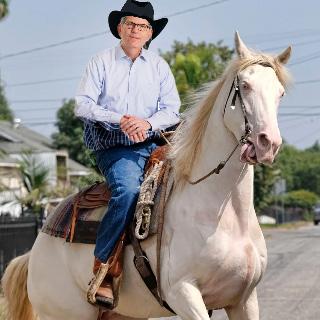
Things that Union Board could have bought with the money they spent on Fall Fling: - 2 Lamborghini Aventadors - Enough 8 balls of coke for everyone in Connor - Hurricane relief for the entirety of Western North Carolina
Note: The Yowl is a satirical supplement to The Davidsonian Hence, nothing in it should be taken as truth.